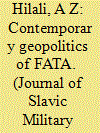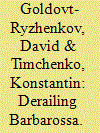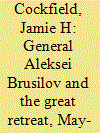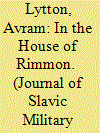| Srl | Item |
| 1 |
ID:
126977


|
|
|
|
|
| Publication |
2013.
|
| Summary/Abstract |
In the post-9/11 era, the international strategic and political culture changed. The notion of 'global Jihad' became popular. The prevalence terrorist violence legitimized US interventions in Afghanistan. It further expanded to Pakistan's Federally Administered Tribal Areas (FATA) making it the chessboard of great power politics. The United States and NATO have launched military operations against the Taliban and al-Qaeda network. It blamed Pakistan for providing a safe haven to militants in its tribal belt. It is a fact that foreign intervention has become the main catalyst for militancy. The War on Terror is a 'bleeding wound' for Pakistan and people perceive that Islamabad should disassociate from the US-led war because it is against the national interest of the country.
|
|
|
|
|
|
|
|
|
|
|
|
|
|
|
|
| 2 |
ID:
126978


|
|
|
|
|
| Publication |
2013.
|
| Summary/Abstract |
This article begins a three-part study into tactical level combat during the battle for Smolensk. The study traces the evolution and experiences of a Red Army rifle regiment from its formation through combat in the summer of 1941. Its objective is to infuse primary source documents dealing with combat at the regimental level and below to complement sections of Colonel David M. Glantz's extensive four-volume work on the battle of Smolensk, whose narrative volumes were published in 2009 and 2010. By focusing on a single rifle regiment and combat at the tactical level, we hope to provide an authentic and detailed view of life and combat in the Soviet (Red) Army during the earliest stage of the Soviet-German War.
|
|
|
|
|
|
|
|
|
|
|
|
|
|
|
|
| 3 |
ID:
126980


|
|
|
|
|
| Publication |
2013.
|
| Summary/Abstract |
General Aleksei Brusilov's fame rests on his successful offensive in 1916, yet he had many other career triumphs. One was his auspicious leadership of the VIII Russian Army during the 'Great Retreat' of 1915, when his skillful generalship was a major factor in preventing the total rout of the Southwestern Russian front. Although he retreated with other armies, he took thousands of Austrian and German prisoners in doing so and eventually launched at the end of his own offensive, which gave the enemy quite a bloody nose. The successes he had in 1915, which have generally gone unnoticed by historians, displayed the leadership qualities he so well demonstrated in his great victory of 1916.
|
|
|
|
|
|
|
|
|
|
|
|
|
|
|
|
| 4 |
ID:
126981


|
|
|
|
|
| Publication |
2013.
|
| Summary/Abstract |
British efforts to aid the Soviet Union in the early months of the war in the East are underexplored and simplified in the historiography of Allied supply to the Soviet Union during the Second World War. In fact, British leaders recognized within weeks of the German invasion that the Eastern Front was the most important front in the war against Nazi Germany and that the Soviets were likely to continue to resist for a long time. Britain then became increasingly committed to supplying the Soviets with material aid. Despite the difficulties involved, and Soviet uncooperativeness, British aid prior to the Moscow Supply Conference was substantial and relatively swift. The expansion of aid into a large-scale effort, later established on a lend-lease basis, had its origins in the evolution of British assessments and priorities over the summer of 1941.
|
|
|
|
|
|
|
|
|
|
|
|
|
|
|
|